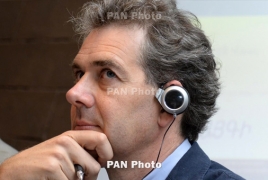
British journalist and writer Thomas de Waal has weighed in on the Armenian and Azerbaijani sides' policies over the Nagorno Karabakh conflict in a new interview with Eurasia Diary.
According to him, Armenian Prime Minister Nikol Pashinyan who took the post after leading nationwide protests against former authorities last April-May, is a different kind of leader for two reasons.
"First, he is much of a natural democrat than his predecessors. He genuinely wants to talk to society and hear the opinions of ordinary people. Secondly, he is from Yerevan and not from Karabakh, unlike his two predecessors. So he is more hesitant in saying that he can speak on behalf of the Karabakh Armenians. The previous political regime is also still in power in Karabakh and they are not Pashinyan’s natural allies. This explains Pashinyan’s different approach to the negotiations. He is ready to start a different kind of debate but he is not in a hurry," the expert says.
"Pashinyan says publicly that he wants the Karabakh Armenians to take part in the negotiations, as they did in the 1990s. To some extent, I believe he is taking this position to “play for time.” He does not want to rush ahead with an intensive negotiation process and wants to focus on domestic issues in Armenia. But I also believe he is genuine about this position. I am sure that, like every leader of Armenia, he understands the need for compromise on the Karabakh issue, but he wants to have genuine discussions inside society about this and he wants to reassure the Karabakh Armenians that he will not force them to take positions they do not like."
De Waal maintains that Azerbaijan’s fundamental position remains the same, but it has softened its stance on some smaller issues recently, so as to give Pashinyan more of a chance, to “cut him some slack.”
"The most significant move in my view is that Baku has agreed to the establishing of a “hot line” between military commanders on both sides. This will make the Line of Contact more predictable and undoubtedly save lives of young soldiers. So I see some progresses in de-escalating tensions on the front-line and resolving security problems. However the political positions of the two sides remain unchanged and it is much harder to see how they can make progress on political issues in the near future," he says.

